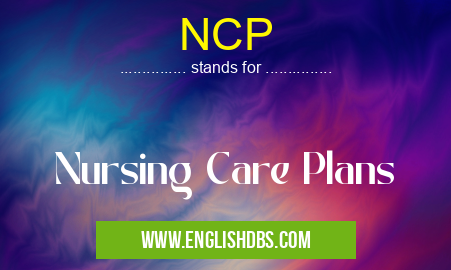What does NCP mean in MEDICAL
NCP stands for Nursing Care Plans, which are documents care plans created by nurses to ensure that a person or group of people receives the best possible care. These plans detail the appropriate interventions and evaluations for a given patient. The purpose of creating a nursing care plan is to ensure quality continuity in the healthcare provided to each individual patient. It also serves as an organized record of the nursing staff's actions and interventions while caring for the patient. NCPs provide guidance and direction to nurses, helping them to better understand how to assess, plan, implement, and evaluate their patients' conditions

NCP meaning in Medical in Medical
NCP mostly used in an acronym Medical in Category Medical that means Nursing Care Plans
Shorthand: NCP,
Full Form: Nursing Care Plans
For more information of "Nursing Care Plans", see the section below.
Essential Questions and Answers on Nursing Care Plans in "MEDICAL»MEDICAL"
What is a Nursing Care Plan (NCP)?
A Nursing Care Plan (NCP) is a document which outlines a plan of action for the medical care of individuals in nursing or health care settings. It details the assessment, diagnosis, intervention and evaluation of patient needs. The purpose of an NCP is to facilitate coordinated, comprehensive and cost-effective patient care.
How is a Nursing Care Plan (NCP) created?
A Nursing Care Plan is created through an iterative process that involves gathering information from the patient, family members and other relevant sources, formulating diagnoses based on this data, developing goals and interventions that address the identified diagnoses, implementing interventions and evaluating their effectiveness.
Who uses Nursing Care Plans (NCPs)?
NCPS are typically used by nurses but can also be utilized by other healthcare professionals including physicians, psychologists, occupational therapists and social workers.
What are the components of a Nursing Care Plan (NCP)?
The components of an NCP include patient assessment data, diagnosis/problem list, goal setting, interventions/nursing orders and evaluation.
What advantages does having a Nursing Care Plan (NCP) provide?
Having an NCP provides many advantages such as providing a structured approach to assessing and managing patient care; promoting communication among health care team members; improving continuity of care across multiple health care settings; promoting evidence-based practice; and improving patient outcomes.
Should all patients have an individualized Nursing Care Plan?
Yes, every patient should have an individualized NCP tailored to their specific condition/needs that includes goals appropriate to their current functioning level in order to ensure optimal outcomes.
How often should a Nursing Care Plan (NCP) be updated?
An NCP must be reviewed regularly to ensure it remains accurate and up-to-date with changes in the patient's condition or treatments as well as any new therapies or medications that may be prescribed. It is generally recommended that nurses review each plan every 1-2 weeks or as needed when there are significant changes in the patient's status.
NCP also stands for: |
|
| All stands for NCP |
